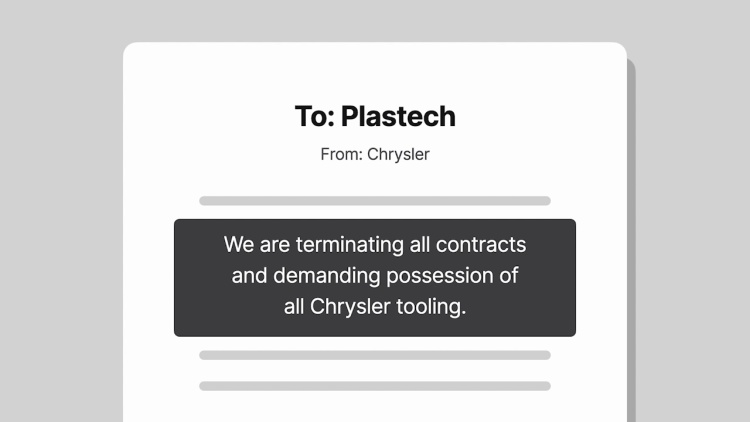Chrysler LLC v. Plastech Engineered Products
United States Bankruptcy Court for the Eastern District of Michigan
382 B.R. 90 (2008)
- Written by Ryan Hill, JD
Facts
Plastech Engineered Products (Plastech) (debtor) produced plastic car components for automobile manufacturers, including Chrysler LLC (creditor). Plastech typically entered into tooling agreements with its customers. Under these agreements, the customer would pay for and own the rights to the specialized tooling equipment necessary to produce the customer’s unique components. Chrysler and Plastech’s tooling agreement provided that Plastech did not have an interest in the tooling equipment Chrysler paid for; that Chrysler had the right to immediate possession of the tooling equipment on demand; and that, in the event of a dispute over whether tooling equipment was paid for, Chrysler could still take possession while the dispute was being resolved. Chrysler became aware that Plastech’s financial situation was deteriorating and eventually knew that Plastech had become insolvent. Chrysler sent a letter to Plastech terminating all contracts and demanding the return of all Chrysler tooling equipment. On the same day, Chrysler filed a suit against Plastech to obtain an order requiring Plastech to immediately deliver all of Chrysler’s tooling equipment. Later that day, Plastech filed for reorganization under chapter 11 of the bankruptcy code. The following day, Chrysler filed a motion to lift the automatic stay in order to remove the tooling equipment from Plastech’s facilities.
Rule of Law
Issue
Holding and Reasoning (Shefferly, J.)
What to do next…
Here's why 907,000 law students have relied on our case briefs:
- Written by law professors and practitioners, not other law students. 47,100 briefs, keyed to 996 casebooks. Top-notch customer support.
- The right amount of information, includes the facts, issues, rule of law, holding and reasoning, and any concurrences and dissents.
- Access in your classes, works on your mobile and tablet. Massive library of related video lessons and high quality multiple-choice questions.
- Easy to use, uniform format for every case brief. Written in plain English, not in legalese. Our briefs summarize and simplify; they don’t just repeat the court’s language.





